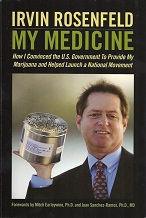How can you argue with parents whose children are seriously ill but see major improvements in their health from using cannabis? Essentially, you can’t. They’re living proof that marijuana is miraculous medicine. Five of these parents—Chad and Diane Ulrick, Lisa Smith, and Jim and Erin Powers—share their stories.
Tell us about your children.
Diane Ulrick: Our son Colin is almost 11 and has Smith-Magenis syndrome. It’s a rare genetic disorder. He has seizures and explosive meltdowns.
Chad Ulrick: The doctors say they ran out of medicine to give him—they tried every single prescription that was available.
Diane Ulrick: And psychiatrists refuse to see him because he can’t say what’s wrong with him. They won’t see him to treat his meltdowns and these anxieties. We were like, “What are we supposed to do with him?”
His medications stopped working, and the serologists suggested medical marijuana for his behavior. Colin started using medical marijuana at age nine, so it’s been almost two years.
We use oil. Sometimes we put it in capsules. We’ve learned that it works better by just putting it on sour cream. And Colin started to show some improvements. The seizures, the behavior—it fixed things we never would have thought it could. Now he can focus; he can sit down and listen to the teacher and actually learn more signs, learn more speech.
Chad Ulrick: His teacher knows all about it, too. His teacher is all for it and loves it and sees the effect that it’s had.
Diane Ulrick: It’s our life and his. We’re afraid that we’ll have to put him in a home if he can’t get his medicine. This is our medicine; it’s his medicine. We feel like we’re criminals, and we shouldn’t be criminals for trying to treat our son when the psychiatrists, the doctors, won’t help anymore. It’s up to us—and Michigan—to help.
 Chad and Diane Ulrick with son Colin
Chad and Diane Ulrick with son Colin
Jim Powers: When our son Ryan was three, he developed something called minimal change disease. What occurred is, he started swelling up. We took him to the doctor repeatedly. They kept telling us it was allergies, but the swelling continued and worsened over the weeks.
We took him to a urologist who did tests and told us that we needed to take him immediately to an emergency room. We did, and they ran some tests and said they believed he had something called nephritic syndrome.
Kidneys filter out tons of different substances. One of the substances that they’re supposed to keep in your blood is metabolized protein, called albumen. Ryan’s kidneys were causing him to leak metabolized protein into his urine, and the protein levels were incredibly low in his blood. That’s what caused this insane swelling.
The hospital we went to didn’t have specialists, so we went to the Children’s Hospital of Michigan in Detroit. After some more tests, they said it was minimal change disease, a chronic autoimmune disease. There’s no root cause and there’s no known cure.
They put Ryan on a very high course of steroids and told us not to worry, that he’d be a normal kid. He went into remission. But when we started weaning him off the steroids, he immediately relapsed. We repeated this cycle several times; each time, the result was the same. So he earned a couple more labels: “steroid-dependent” and “frequently relapsing.”
Ryan was three at the time. The specialists told us we needed to try autoimmune suppressants and gave us two options. One was a drug called CellCept SangCya, which they give transplant patients to suppress their immune systems. Another was Cytoxan, which is chemotherapy.
Obviously, we tried the SangCya first, but he failed that therapy. The doctors then said we needed to immediately try the Cytoxan. After some debate, we tried that, and he failed that therapy as well. All of this was while he’s on this very high dose of steroids, which were doing horrible things to him.
The Cytoxan can only be taken once in his lifetime. There’s no taking it twice, there’s no extended course—it’s a one-time shot. We felt we were running out of options, so we decided to go with cannabis oil.
A couple of things happened. The first was that Ryan’s demeanor changed immediately. Anyone who’s been on a very high dose of steroids will tell you that it’s horrible—it screws with your emotions like nothing else. Ryan went from being a happy three-year-old to being a little terror, to the point that he didn’t even know why.
Erin Powers: He gained 10 pounds just from steroid weight. When he was with friends, he’d wobble after them, trying his best to have some semblance of what he had before.
The cannabis oil just gave him so much more freedom. It helped him so much—his moods changed, he wasn’t nearly as upset. We give it to him in an olive-oil-and-coconut suspension. He takes it in a syrup, like his other medications—one right after another. It immediately improved his mood and his attitude. Within a week or two, Ryan went back into remission. We started weaning him off steroids, and this time he didn’t relapse. He was still on his pharmaceuticals; we just added the cannabis oil to them. I believe he was in remission for 234 days. The longest-running remission before that was 14 days.
With any autoimmune disease, any time the immune system becomes what they call “active but challenged,” it can cause a relapse. Ryan’s had relapses from time to time, but he’s well over 230 days again, and at this point he’s completely off steroids as of this past week. This is brand new: He’s never been off steroids completely since he was diagnosed. Now he is. We credit a lot of that to diet, and we also credit a lot of that to cannabis oil.
Jim Powers: Ryan is now six. We’ve seriously been using it for two years.
 Erin and Jim Powers with son Ryan
Erin and Jim Powers with son Ryan
Lisa Smith: My son Noah is five. He has Dravet syndrome and autism. He was developing normally up until he received his nine-month vaccinations. Within 12 hours, he was seizing. We took him to the hospital. With previous vaccinations, he never had a fever, never had reactions. Two weeks later, he had another seizure. We went through a period of trying to get him diagnosed. Once we finally did get some genetic testing done, he came back positive for selective mutism [a psychiatric disorder].
Noah has all types of seizures. He has absence seizures, grand mals, petit mals, drop seizures—he has seizures that don’t register on the EEG equipment. I saw Charlotte Figi’s story [the child whose epileptic seizures were reduced by using CBD-rich oil], and I’d read about parents using cannabis for their children. Being a single mom, I need a little help, because I’m going to find myself in a position where I can’t handle him anymore, and I’m going to be faced with the decision of possibly having to put him in a home. I just couldn’t find myself doing that.
Noah was having a hard time of it with pharmaceuticals. He ate, but nothing was controlling his seizures. He had failed just about every anti-epileptic medication there was, and the behavior meds were no longer working. He was just a mess. He would bang his head on the file cabinet, on the wall—tantrums, hitting, punching, pulling, kicking, the whole nine yards. Because of his autism, he also has developmental issues.
We tried everything else medically possible that we could think of before we tried cannabis. Now that he’s using it, I’ve been able to wean him off all of his behavior meds. And he’s actually three-quarters of the way weaned off all of his seizure meds.
Noah’s five now, and he started using cannabis at three and a half. We give him the cannabis oil in a coconut-oil base. He takes it right out of the syringe, just like every other medication that he’s ever taken. Sometimes I use raw cannabis juice and freeze it into ice cubes. One or two a day does help with whatever he’s drinking.
In the past, when Noah had a bad seizure, he would lose skills and have to regain everything. But with cannabis, he didn’t lose any skills; there wasn’t any regression whatsoever. He’s actually progressed and goes to ABA [applied behavior analysis] every day for his autism. He’s been making all of his goals. His teachers know that he’s been on medical marijuana. We’ve had nothing but support from everybody. His own neurologist has been very supportive.
 Lisa Smith with son Noah
Lisa Smith with son Noah
What has your experience been with mainstream medicine?
Diane Ulrick: The neurologist, who had other children he was working with—he’s the one that suggested it. He said, “Go to a compassion center.” It took us about a year to think it over and investigate it, because we didn’t want to give our son something harmful. Right before we decided to do it, um, I asked the neurologist if he could please find some other kind of medication for Colin. And he said, “I told you what to do.”
Erin Powers: With Ryan, when we were at the Children’s Hospital, I was talking to his nurse and brought up something about chemo—that my husband had been researching medical marijuana. She instantly cut me off and asked, “Well, you’re not giving it to him, are you?” So, of course, we were like, “No, no. We’re not doing that.”
Jim Powers: We’ve made a lot of progress in the last three years. Ryan is a perfect example: I called at least 60 doctors [to get him certified for medical cannabis]. I could only find two of them—after calling 60 doctors in the state of Michigan. But now doctors are certifying children. Every parent who has a child with a chronic illness wants to try this. We’ve got neurologists and pediatric neurologists who are signing recommendations; we’ve got pediatric oncologists who are signing recommendations. This is all brand new. It’s a huge first step.
Are they monitoring its efficacy? Not really, other than anecdotally. But what we need is actual charted evidence to start getting some of these major hospital systems on board.
Lisa Smith: I would love to hand them a packet and tell them that this is exactly what we’re doing [to treat my son]. But that also opens you up: What if they’re not okay with it? I had to go to the emergency room. Do we even let them know that we give Noah cannabis oil?
I’m afraid of getting that knock on the door. I’m not very afraid of the medical professionals calling—they’re all working with us. But neighbors who don’t know exactly what’s going on, they might think, “Something strange is going on over there, because Noah used to be like this and now he’s like that.” Word of mouth, things like that… I would have a hard time because of my own circumstances, alone. I’m a single mom and disabled, so most of the time, I have to do everything by myself.
Jim Powers: At the end of the day, I’m not going to live in fear. The more we make our cases with factual evidence, the less people will be concerned about it. My wife and I have been relatively vocal and in the public eye in the last year. I feel that it’s really protected us—because I truly believe that most people understand and can sympathize with the fact that we have very sick children, and we are doing everything we can in our power to help them.
Most folks in law enforcement have kids. Most of them are supportive, frankly. Though they’ll never go on the record as being supportive, they are.
Erin Powers: Somebody’s got to do it. I mean, everybody wants to pack up and move [to a legal state]. But what about the folks who can’t move? We love Michigan and we want to stay in Michigan, and the only way we can is to fight for ourselves.
The more you say things, the more you hope people will understand. The law issue—there are so many questions that we want resolved. We want to continue our lives and not worry and not feel like we have to hide anything we do.
Jim Powers: We’ve formed Parents for Compassion, a loosely assembled group of parents. We try to generate activity when there’s any legislation that would benefit our families. We talk to our lawmakers, we show up at hearings… but when all is said and done, there will be more issues. There are parents who aren’t speaking up right now; they want to try cannabis, but they’re scared. We’d like to be in a place where they can get information, keep the network going, be there to answer a couple of questions, make the process a little less scary.
Describe your feelings about cannabis now.
Diane Ulrick: A lifesaver. When I grew up, it was the enemy. It was fatal to do drugs. Now I know it’s a lifesaver.
Chad Ulrick: I can’t believe she’s actually changed her mind—she sees it that way now. When I met her, it would have been totally forbidden.
Jim Powers: I grew up in a not terribly liberal household, but there was never any ill intent toward cannabis. This has just furthered my belief in natural medicine, and that cannabis is one piece of that. I’m just grateful that we have it as an option, because I’m not sure what we would do if we didn’t.
Lisa Smith: What other plant could do this at this point? It’s not five or 10 different medicines; it’s just one plant. That in itself is absolutely amazing.
Erin Powers: Well, I grew up around cannabis—aunts, uncles, cousins, you name it—but it was recreational use. I never really took in how valuable a plant it could be until my son ran out of options. Then I started looking for alternative therapies—because if I didn’t find something, I was going to lose him. If I didn’t lose him to Child Protective Services, I was going to lose him permanently: His life would be taken from me. That is my fear still, because of his condition. So cannabis has been a lifesaver, definitely.
Rich Thompson moderated this round-table discussion.






 Chad and Diane Ulrick with son Colin
Chad and Diane Ulrick with son Colin Erin and Jim Powers with son Ryan
Erin and Jim Powers with son Ryan Lisa Smith with son Noah
Lisa Smith with son Noah

